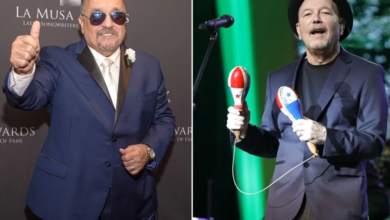Qatar 2022: The Upcoming World Cup’s Music Stands Out
"Arhbo" and "Hayya Hayya" are the first songs on the Qatar 2022 World Cup soundtrack. Both stand out for their joy, their different musical rhythms and the contribution of Latin artists.

Photo: YT-FIFA
LatinAmerican Post | Theoscar Mogollón González
Escucha este artículo
Leer en español: Qatar 2022: El mundial ya destaca por su ritmo musical
FIFA Sound is FIFA's latest strategy to connect audiences around the world through football and music. With the Qatar 2022 World Cup getting closer, this initiative has already begun to promote the first songs of the tournament's soundtrack with "Arhbo" and "Hayya Hayya", which stand out for their freshness, joy, and the collaboration of artists from all over the world. the continents.
The first single, "Hayya Hayya", premiered in April during the group draw and served as a starter for what will be a global party. The title translates as "Better Together" and is performed by Qatari Aisha, Nigerian Davido, and Trinidad Cardona. In it, we hear influences from R&B and reggae, in addition to its video clip that stands out for showing part of the Arab musical culture and showing images of the past world.
Unlike the previous World Cup events, with FIFA Sound they seek to bring the fans closer through music, as Kay Madati, director of the FIFA Commercial Division, explained in a press release. “By uniting voices from the Americas, Africa, and the Middle East, the song symbolizes how music and football can bridge the world. This soundtrack will bring ardent fans closer to the spirit of the FIFA World Cup than ever before.”
Ozuna represents the urban in "Arhbo"
Among the next singles, "Arhbo" has all the ingredients to become the main theme of the Qatar 2022 World Cup. Puerto Rican Ozuna does a duet with Franco-Congolese rapper GIMS in a song that not only stands out for its mixture of urban and Arabs sounds, but also because it is capable of lifting spirits and carrying a message of unity. In fact, the title comes from a colloquial Qatari term that translates as "Welcome".
Both artists star in the music video, which highlights several characteristic places in the country as well as the stadiums that will host the World Cup. In addition, the dance becomes more relevant on this occasion as it has more Arab influence combined with rhythms such as the tawil or the Malouf. Until now, the reception has been quite positive from the fans, who are waiting for the release of the other singles that will make up the playlist.
Read also: The Petronio Álvarez Seeks to Become the Most Important Afro Festival in Latin America
Likewise, the producer RedOne, FIFA's entertainment creative executive, anticipated that the Qatar 2022 World Cup will be one of the best musically speaking. “It will be a celebration of football and music, in which we will welcome the world and celebrate our union and everything that we are passionate about. On an occasion like this we have to make the most of it and live it together. The opening ceremony will be held on November 20.
The Latin touch in the World Cups
Over the years, Latin artists have not ceased to be part of the official songs of the World Cups. Ozuna joins this interesting list that already knows what it is like to have artists of the urban genre harmonizing these events. Precisely, Nicky Jam was the protagonist -along with Will Smith and Era Stefi- in Russia 2018 with "Live It Up".
For its part, the official theme of Brazil 2014 was full of samba and joy thanks to the contribution of Pitbull, Jennifer López and Claudia Leitte. Four years earlier, in South Africa 2010, Shakira was in charge of interpreting the hit "Waka Waka", considered by many to be the best song in a World Cup. While Ricky Martin did the same with "La Copa de la Vida" in France 98.
And despite not being considered official, some songs remained in the memory of fans such as "Let football not stop", by Patricia Manterola in 2002; Shakira's 2006 hit "Hips Don't Lie"; "La la la", again by the Colombian for 2014; "Colors", with Maluma and Jason Derulo in 2018; and "Love", by Sebastián Yatra also in the world past.




